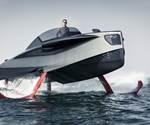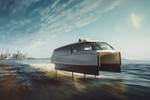Artemis Technologies demos composite zero-emissions CTV for offshore wind
The Belfast company’s first electric foiling EF-12 CTV watercraft prototype will undergo simulation and testing at Ørsted’s Barrow wind farm for the next 2 years.
Jesper Holst, senior product owner at Ørsted is pictured with Artemis Technologies’ commercial director, David Tyler. Photo Credit: Artemis Technologis
A demonstrator project, led by high-performance maritime design and applied technologies company (Belfast, Ireland) has been awarded £2.3 million to prove the company’s capability of serving the offshore wind farm sector through demonstration of its first electric foiling crew transfer vessel (CTV) and daughter craft, the . It is manufactured from glass and carbon fiber composites, which enable higher speeds and longer range.
Financial support, as part of the Clean Maritime Demonstration Competition Round 3 (CMDC3), is funded by the U.K.’s Department for Transport and delivered in partnership with Innovate UK.
Artemis Technologies has already launched to market a commercially viable, 100% electric, zero-emission foiling workboat range. According to the company, this project will further prove these vessels, powered by Artemis Technologies’ eFoiler propulsion system, have viable range and can safely transit technicians from shore to turbine in up to 1.5-meter waves, a market-wide requirement for CTV operations.
“Through simulation and ongoing testing in Belfast of our 11.5-meter prototype, we have already demonstrated that our vessels improve ride comfort and energy efficiency by up to 90%, while generating zero greenhouse gas [GHG] emissions, when compared to fossil fuel counterparts currently in operation,” David Tyler, commercial director at Artemis Technologies, says. “The next step is to transition this into an operational CTV pilot scheme, where offshore wind farm operators can experience firsthand the improved sea keeping as well as economic and environmental benefits of our vessels in comparison to current designs.”
Artemis Technologies has partnered with renewable energy company (Fredericia, Denmark), offshore access specialist (BC, Canada) and maritime leader (London, U.K.), to develop, test and deploy a 12-meter 100% electric foiling CTV and shore-based charging infrastructure at Ørsted’s Barrow wind farm on the U.K.’s west coast over the next 2 years.
The backing of this CTV demonstration project is said to be just the latest recognition by the Clean Maritime Demonstration Competition of Artemis Technologies’ prowess for developing transformative decarbonizing technology; Artemis has previously received seven-figure funding from the CMDC to support a total of six projects in collaboration with global partners in 2021 and 2022, respectively.
Funding comes following a successful year for Artemis Technologies which saw the continued rollout of its foiling workboat range mentioned up above, and unveiling the design of the company’s 100% electric, 150-seater that will hit the water next year.
Related Content
-
Plant tour: BeSpline/Addcomp, Sherbrooke, QC, Canada
Composites automation specialist increases access to next-gen technologies, including novel AFP systems and unique 3D parts using adaptive molds.
-
Revisiting the OceanGate Titan disaster
A year has passed since the tragic loss of the Titan submersible that claimed the lives of five people. What lessons have been learned from the disaster?
-
Anemoi installs 35-meter-tall composite rotor sails on Sohar Max maritime vessel
Carbon fiber-reinforced epoxy composites are key to building these long-lasting wind propulsion technologies for energy-efficient watercraft.






